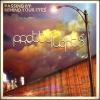I should also reiterate that using Gaba agonists/mimetics do carry the risk of dependence (as in the case of Phenibut, Baclofen, Benzos and Gabapentin/Lyrica to a lesser extent) so shouldn't be used for long and sporadically if at all possible, especially when considering phenibut and for those prone to addiction, benzos. Baclofen has nearly no recreational potential and is easier to come off. NMDA antagonists aside from Magnesium may also be the way to go if you can tolerate them as they're job is to block glutamate where the gabaergics help restore a balance between Glutamate and Gaba in scenarios where excitotoxicity may be of concern.
Yeap, the above is important. Also, I think "long acting" (with a large half-life) is vital. I naively estimate that a redose should be after 2/3rds of the half-life has completed. For example, if the half life is 12 hours, a redose should follow after every 8 hours. Is this reasonable? Personal trials are planned.
Tapering off slowly at the end is presumably consequential too for these classes of drugs.
Magnesium, even magnesium threonate, wears out rather fast and hasn't really done much for me or Rudy. I take it anyway.
I now finally have a hypothesis for why alcohol, which I think is both a gabaergic and an NMDA antagonist, does not help and actually worsens the symptoms for a whole day. I think the explanation is that it is too short acting, and evokes a strong rebound effect. I think this was mentioned on this thread previously by the user Lenses. Or if there is some other reason, such as its effect on specific serotonin receptors, I wouldn't know.
Edited by Climactic, 21 June 2013 - 06:31 PM.























































